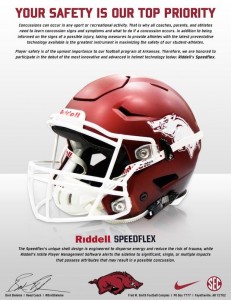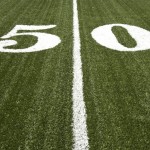‘League of Denial’ Authors Offer Thoughts on New Razorback Helmet:
The “SpeedFlex”
By Simon Lee
Mark Fainaru-Wada and his brother Steve Fainaru were in Little Rock this week speaking at the Clinton School of Public Service on their groundbreaking book “League of Denial: The NFL, Concussions and The Battle for Truth.”
Research for the book was also the impetus for the PBS Frontline documentary of the same name. Evin Demirel reviewed the documentary for Vice late last year, writing in part:
The NFL is the most powerful and popular sports league in the country. At this point, it might be the most dominant institution in America, period. In its 93 years, it’s grown to become both an altar of mainstream manhood and a multibillion-dollar industry that puts on the most highly rated programs on TV. The NFL is so big that fantasy football, a game for grown men where you watch players compile numbers in another game, generates a billion dollars a year by itself. By now you’re likely familiar with the widely accepted truth that all that tackling involved in the sport damages players’ brains, often horrifically—Alan Schwarz’ New York Times reporting on that subject started way back in 2007. But if you watch the sport, you probably don’t care enough to stop watching.
PBS’s Frontline is going to try to make you care more.
League of Denial: The NFL’s Concussion Crisis, a documentary airing tonight based on a book that was released today, is the most direct assault on the league to date. The film not only reviews the by-now-at-least-faintly-familiar evidence that football collisions are very bad for you, it exposes the NFL’s attempts to cover up the damage the sport does to young men’s brains. The league’s executives and doctors come off as myopic and foolish at best, and scheming and evil at worst—in story after story, League shows NFL players dying after losing their minds due to what most independent doctors agree is football-induced brain damage, then the NFL is shown repeatedly denying the connection between football and the broken families it has left behind.
Today it may be harder to find a casual fan of the sport who doesn’t see a link between football and concussions. In fact, even the most die-hard football fan, which Steve Fainaru, the Pulitzer Prize-winning investigative journalist and co-author of League of Denial, is, saying to the crowd at the Clinton School: “I’m a 49ers season ticket holder. I love the sport. And I don’t want it to change.”
That’s probably the position of many other football fans.
There’s a quote from the documentary in which the doctor who made the first discovery of a potential link between football and brain disease, Dr. Bennet Omalu, a Pittsburg junior pathologist trained in neuropathology recalls being told by an NFL doctor: “If 10 percent of mothers in this country would begin to perceive football as a dangerous sport, that is the end of football.”
The Fainaru brothers pointed out in their presentation this week there has been a 10 percent decline in participation in “Pop Warner” youth football programs the past two years.
As the realities take hold and science becomes clearer on the long-term dangers of concussions and repeated traumatic blows to the head while playing football, capitalists do, what capitalists do – take advantage of an emerging market and create new industries. The Fainaru brothers see the growth of the “make the sport safer” industry and addressed it when a member of the audience asked their thoughts on the new Razorback helmet – the SpeedFlex helmet from Riddell.
 Last month, Bret Bielema, head coach of the Arkansas Razorbacks football team, tweeted a marketing and promotional piece about the new Razorback helmet to his followers. “Very excited to have our players wearing these helmets. Player safety always Priority 1 #WooPig,” Bielema wrote.
Last month, Bret Bielema, head coach of the Arkansas Razorbacks football team, tweeted a marketing and promotional piece about the new Razorback helmet to his followers. “Very excited to have our players wearing these helmets. Player safety always Priority 1 #WooPig,” Bielema wrote.
The Riddell SpeedFlex helmet is loaded with sensors and other design features. The marketing piece used by the University of Arkansas, signed by Bielema and including the Nike and SEC logos, starts with a headline, in red: YOUR SAFETY IS OUR TOP PRIORITY.
The piece goes on to detail:
“Concussions can occur in any sport or recreational activity. That is why all coaches, parents, and athletes need to learn concussion signs and symptoms and what to do if a concussion occurs. In addition to being informed on the signs of a possible injury, taking measures to provide athletes with the latest preventative technology available is the greatest instrument in maximizing the safety of our student athletes.
“Player safety is of the upmost importance to our football program at Arkansas. Therefore, we are honored to participate in the debut of the most innovative and advanced in helmet technology today: Riddell’s Speedflex.
“The Speedflex’s unique shell design is engineered to disperse energy and reduce the risk of trauma, while Riddell’s InSite Player Management Software alerts the sideline to a significant, single, or multiple impacts that possess attributes that may result in a possible concussion.”
All good and positive stuff, but will helmets like these work to reduce concussions, therefore resulting in the reduction or elimination of long-term brain damage for the people who play the sport?
Mark Fainaru-Wada says improved helmets and sensors and other new technologies in this growing “make the sport safer” industry are certainly a piece of the puzzle, but he cautions: “Currently, there is no helmet that will solve this.”
He goes on to remind the audience why helmets exist in the sport: to reduce skull fractures.
Helmets have done the job they are designed to do, he says, but when it comes to concussions, any helmet, even the newest, high-tech helmet, may actually continue to have the opposite effect on concussions. You see, Fainaru-Wada says, the helmet has become a weapon in the sport.
Despite the primary function of a football helmet to reduce skull fractures, manufacturers like Riddell continue to broaden the purpose of their equipment, attempting to make the sport safer for players, which is a good thing to do, for player safety and their bottom line.
Sometimes the marketing of “safer” equipment and the science that could prove a helmet is actually safer for players are at odds, as was the case with Riddell and others last year. The staff of the Federal Trade Commission closed investigations of three companies that manufacture and sell football helmets: Riddell Sports Group, Inc., Schutt Sports, Inc., and Xenith, LLC, all of which removed or agreed to remove “potentially deceptive claims about concussion prevention from their advertising.”
In a letter to the lawyer for Riddell, the FTC wrote:
The staff of the FTC’s Division of Advertising Practices has conducted an investigation of Riddell Sports Group, Inc. (“Riddell”) for possible violations of Section 5 of the Federal Trade Commission Act, 15 U.S .C. § 45 , in connection with Riddell’s advertising for its Revolution® football helmets. Our inquiry focused specifically on whether Riddell falsely represented from at least 2008 until early 2011 that research proves that Revolution® varsity and youth football helmets reduce concussions and the risk of concussion by 31% compared to other varsity and youth football helmets.
Riddell’s advertising of its concussion risk reduction was based on a study reported in an article entitled “Examining Concussion Rates and Return to Play in High School Football Players Wearing Newer Helmet Technology: A Three-Year Prospective Cohort Study,” which was published in the journal Neurosurgery in February 2006 (hereafter “the Neurosurgery article”). The article compared the concussion rates between two groups of high school football teams: (1) test group teams, which received new Revolution helmets, and (2) control group teams, whose players wore helmets from their schools’ existing stock. The article purported to find concussion incidence rates of 5.3% in the test group and 7.6% in the control group. The authors described these results as a 2.3% reduction in the absolute risk of concussion, or a 31% reduction in relative risk, associated with the wearing of a Revolution helmet.
However, the authors of the Neurosurgery article clearly identified two “significant limitations” to their study:
• Revolution helmets were not randomly distributed across all ofthe participants in the study. The published report characterized the study as “unblinded [and] uncontrolled,” and the authors stated that “Without random assignment, there is no way of knowing whether there were meaningful differences between groups on some important variable(s) that might have influenced concussion rates or recovery times
• Players in the control group who suffered concussions were younger than test group players who suffered concussions; the article’s authors acknowledged that this statistically significant difference in age “may have played a role in the higher incidence of concussion seen in the traditional helmet.”
The staff believes that these limitations are sufficiently serious to preclude the conclusion that the design features of the Revolution helmet, by themselves, were responsible for the difference in the concussion rates experienced by the two groups of players. Therefore, we believe that the Neurosurgery study did not prove that Revolution® varsity football helmets reduce concussions or the risk of concussion by 31% compared to other varsity football helmets.
Despite the conclusions reached by the FTC, the agency decided not to recommend enforcement action against Riddell because the company discontinued the use of the concussion reduction claim and because the study by Virginia Tech did show the new helmet performed “much better” than the company’s traditional helmet in reducing concussion risks related to linear acceleration.
The FTC letter adds:
We also note that our discussion above concerning the limitations of the Neurosurgery study should not be viewed as criticism either of Riddell’s attempt to develop a helmet that provided better concussion protection than traditional helmets, or of the underlying research conducted by the authors of the Neurosurgery article. Rather, we disagree only with Riddell’s decision to use the results reported in that article- particularly given the authors’ express acknowledgments ofthe research’s limitations- as the basis for unqualified claims for Revolution helmets.
Indeed, Riddell and others should not be criticized for attempting to develop safer helmets. Just as the the NFL shouldn’t be criticized for its efforts to tweak and fine-tune the rules to discourage using a helmeted head as a weapon, and the Fainaru brothers didn’t in their presentation this week at the Clinton School.
The brothers point out the league spends money to promote safer tackling techniques and skills at the youth football levels, again, all good things.
It won’t be marketing or claims or advertising and promotion efforts that make football safer for those who play it.
Science is going to lead the issue of safer football, Steve Fainaru says.
As it should.
* * *
Simon Lee is the publisher of Sporting Life Arkansas and owner of Lee & Stafford, LLC., a Little Rock company working with healthcare organizations to improve patient care through education and referral strategies.












